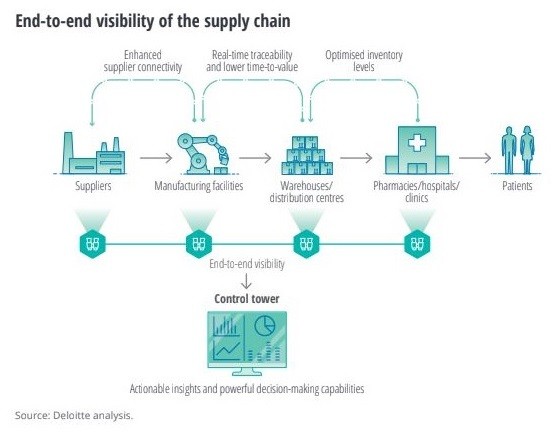Injecting a dose of AI into pharma supply chains
The industry is harnessing the power of disruptive technologies like Artificial Intelligence (AI) to generate actionable insights, consequently improving decision-making.

The Covid-19 crisis has put the pharma industry’s supply chain under strain. As the pandemic continues to evolve, pharma companies are attempting to respond and create a fast, reactive and nimble supply chain capable of mitigating risks across every step and tier of the supply chain and all the logistics movements in between, from raw materials to finished products. To achieve this, the industry is harnessing the power of disruptive technologies like Artificial Intelligence (AI) to generate actionable insights, consequently improving decision-making.
Given the hyper-connected globally complex supply chain of the pharma industry, companies need to be able to quickly respond to any supply chain incident that impacts outcomes. The outbreak of Covid-19 pandemic made it necessary for pharmaceutical companies to scale up their R&D operations and supply chain almost overnight. However, for doing so, they need to factor in several dynamic scenarios and build a robust yet agile working model. Scalable artificial intelligence becomes a powerful way to use multiple large data streams that help pharma companies foresee a business gap and start preparing to address the same.
Citing an instance on how leveraging artificial intelligence to the pharma supply chain helped in demand forecasting, Uday Sharma, chief operating officer, Spoton Logistics, said, “A case in point is the production and supply chain management of personal protection equipment (PPE) kits. Before Covid-19, India had barely any capacity for the same. But when we needed it, AI-based solutions quickly helped manufacturers to project the future demand, regions of high demand, and build the supply chain accordingly. As a result, PPE kits are now widely available across the country. In fact, India has also started to export these kits to other countries. A huge amount of AI-based modelling has gone into this change.”
While pharmaceutical companies adopt scalable AI solutions to enhance their supply chain operations, route planning, demand estimation, behaviour analytics and big data analytics is key to the logistics industry. Device and test kit manufacturers are using AI to respond to the huge demand for more test kits by identifying suppliers within their supply chain, who can pump in more raw materials and parts when supplies drop.
Global consulting firm Deloitte, in its recent study, as part of ‘The Intelligent biopharma series’ explores the ways artificial intelligence (AI) can impact the biopharma value chain. According to the study, digital technologies that improve visibility across the supply chain, such as AI and blockchain, can create a dynamic, interoperable system where transactions are transparent and traceable. AI tools have the potential to unlock commercial, regulatory and operational data to find non-linear and complex relationships that would otherwise be missed and to deliver powerful strategic insights. AI algorithms can deliver significant improvement in productivity and gross margins and contribute to the sustainability of the industry. In particular, AI algorithms can improve end-to-end visibility, leading to more efficient demand forecasting, inventory management, logistics optimisation, procurement, supply chain planning and workforce planning.

Global consulting firm Deloitte explores how artificial intelligence (AI) can help in improving end-to-end visibility.
Adopting scalable AI solutions to enhance supply chain operations
The pharmaceutical industry is centred around innovation and last-mile deliveries. While pharmaceutical companies adopt scalable AI solutions to enhance their supply chain operations, route planning, demand estimation, behaviour analytics and big data analytics is key to the logistics industry. From a supply chain perspective, AI provides deeper visibility and therefore better arms pharma companies to manage any risk. “In today’s on-demand age, it’s an easy assumption to make that companies can simply log into a system to see a map of their supply chain and see who they’re working within the areas most affected by Coronavirus. The reality is quite different. For large companies with different divisions participating in multi-tier supply chains, no matter how many systems they log into it can be challenging to gain a global view of their supply network, particularly as countries start to re-open post-pandemic,” said Neal Singh, chief operating officer, iCertis in a recent opinion piece. iCertis is an enterprise contract management provider in the cloud.
Rohit Vashisht, co-founder and CEO of US-based WhizAI, a purpose-built cognitive insights platform for life-sciences, believes that AI systems are built to scale and bridges the gap that currently exists between massive data stores and actionable insights within the pharma supply chain.
Logistics players catering to the pharma supply chain have also been actively implementing AI to ease operations. For instance, Spoton Logistics has been working very closely with medical representatives who form the backbone of the pharma industry, to put in place a system even well before the pandemic. “Our tech-enabled solutions proactively trigger SMS/email notifications right from the point of pickup/while in transit to the point of delivery to bring ease of visibility to the distributor/ shipper or manufacturer,” explains Sharma.
Road ahead
The pharmaceuticals and life sciences sector is ripe for change and adoption of AI. Early adopters of such cutting-edge technologies that can improve the visibility of their shipments stand to win against their counterparts who do not toe the line. It is about time for the industry to make a conscious shift to convert actionable insights from data than just produce large quantities of data and this can be achieved by embracing advanced digital solutions to unlock their true potential.
This article was originally published in Indian Transport & Logistics News' September - October 2020 issue.



